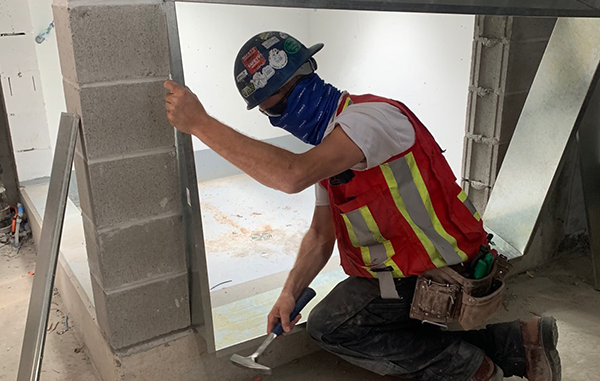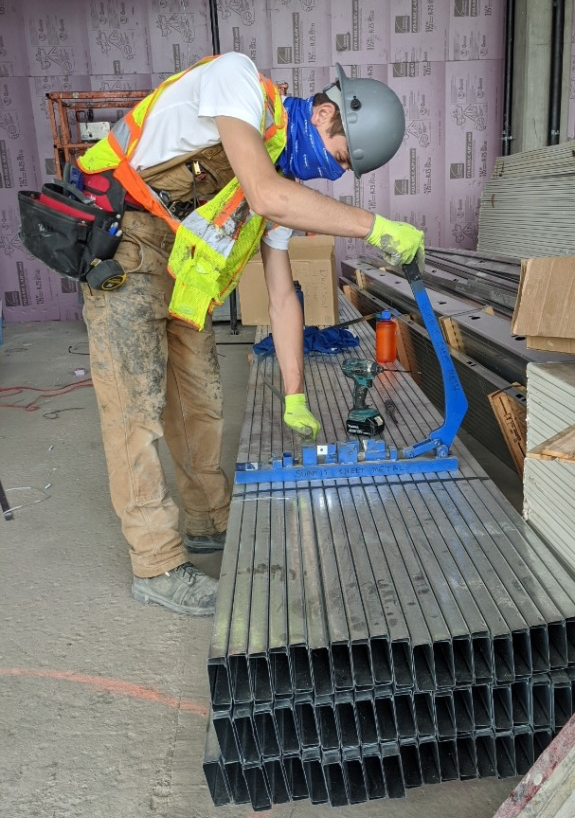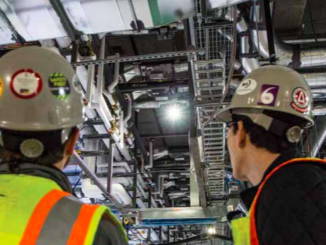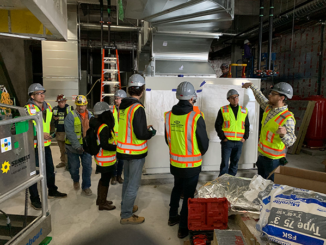
COVID-19 brought uncertainty and cost increases to the sheet metal industry, but SMACNA-BC contractors have weathered the storm
By / Jessica Kirby • Photos courtesy of Summit Sheet Metal
It’s no secret that the first two weeks of March 2020 turned the world upside down. Global and regional health directives came out by the hour, advising individuals and businesses on how to deal with the COVID-19 pandemic. Construction was deemed and essential service, but crews were worried and management had important decisions to make.
Bernie Antchak, principal with Northwest Sheet Metal, says the initial shutdown caused some upset as the workforce struggled to understand the best course of action. Because construction was deemed an essential service, coming to work became, for some, a difficult choice.
“Once the government announced if you feel any sickness and stay home you will get benefits (CERB), we had 20% of our workforce stay home as they had colds or were just worried about contracting this illness,” Antchak says.
The first week, field installation crews were worried while onsite because they felt there were too many people on these sites, and they feared the possibilities of transmission were high. Productivity suffered.
“We were confident it was close to 25% production loss through safety procedures, which, at the time were all over the place,” Antchak says. “Some sites had none, some sites actually closed for a short term, and some were in the middle, so to speak. As a company, we felt if we had to remain open we would lose our shirts if this continued.”
Fast forward a month after the initial week of closures and health directives, and crews were more diligent. Companies were sharing COVID policies and procedures, and production loss gained ground.
“By then, productivity loss had improved and was approximately 5–10%,” Antchak says. “This was due to social distancing, access to work, and PPE variables. Of course, there is also a cost for the pandemic, as cleaners, wipes, masks, and other supplies weren’t cheap.”
Mark McLaren, owner at Ridge Sheet Metal, says the situation during the first few weeks was the same for his crew—many stayed home and those who didn’t were concerned about safety and cleanliness protocol.
“We didn’t have any jobs shut down, but we couldn’t man jobs correctly because half of the crew stayed home for two weeks,” McLaren says. “That was the worst of it. They dwindled back after that, and things seem to have settled since then.”
On job sites, with multiple trades and variation from company to company on how safety protocols are carried out, social distancing and other measures can be difficult and definitely affect productivity.
“As an example, you can’t put more than four guys in a lift, so it takes a long time to get a crew up to the top floor,” McLaren says. “Overall, I’d say we are adjusting fine. We don’t hear much about workers’ concerns any more. People just go to work and wear masks if they have to.”
“When COVID first hit, it was surreal,” says Phil McDonald, co-owner of Summit Sheet Metal. “I was trying to figure out if we were in a reality TV program of some kind.”

Everyone at Summit knew the situation and followed the news, but then a foreman’s wife was sent home because she’d tested positive for COVID-19. “Right away, we sent the crew home for 14 days’ self-quarantine,” McDonald says. “It turned out to be a false positive, but we weren’t taking any chances.”
In the meantime, Summit’s management team sent an email to crew members letting them know they were not being forced to work and to stay home if they felt unwell or uneasy. The crew went from 63 to 24 overnight.
“We sent out everything we were getting from the government and SMACNA-BC about subsidies, how to apply, and how to stay safe,” McDonald says. “We explained we will get through this together, and made sure everyone—the crew, journeys, apprentices, pre-apprentices, and their families—got that message and information.”
While the workforce was self-quarantined, McDonald and the other management got to work keeping up with daily-changing health protocols, sending more information as it became available, and trying to source PPE, sanitizer, and masks.
With these materials hard to come by at the time, McDonald approached an acquaintance at Central City Brewers + Distillers who was able to begin supplying hand sanitizer by April 2.
“To be honest, it was all hands on deck,” McDonald says. “We were scrambling to meet those protocols and fill jobs with a smaller crew. We were hammering it out, but that initial stage didn’t last long. About a week later, the workforce was trickling in.”
One important factor in managing the situation was that some job sites were adequately prepared and following all requirements while others were behaving as though nothing was happening.
“We had some smaller jobs close down, and others were emailing us asking that we get crews in there to finish the work,” McDonald says. “Then we had another situation where some of our job sites had false positives. It was tough, but we made it work.”
And, consumables weren’t the only costs. Besides PPE and cleaning solutions, contractors absorbed the cost of having a staff member onsite sanitizing door handles and surfaces and ensuring proper protocols were being followed.
“I’d say we are getting used to the ‘new normal’ but it’s definitely not over,” McDonald says. “Last month we had one job that tests temperatures each day and just the other day another company introduced a new protocol where we have to assign a COVID representative on the site.”
As time goes by, attitudes have changed, Antchak says, and things are starting to level out. Moving into fall when a second wave is expected, he feels like his crews will be better prepared to handle whatever comes next. “We as a company felt lucky that we were still operational and turning dollars in a positive note, while so many were shut down with large losses,” Antchak says. “We’ve adapted to the procedures and practise safe measures.”
One big take away, since the market essentially shut down during this time, was that for some companies, not many purchase orders were being given out. That meant some companies panicked and through the tender process became very hungry, dropping their profits just to get a job.
“It’s a very unhealthy attitude to have as an industry,” Antchak says. “We need to maintain our margins and remain profitable. This will essentially just create a ‘rob Peter to pay Paul’ effect down the road.”
McLaren agrees: prices for some jobs got far too low, a scenario he finds hard to understand. “COVID has affected schedules on ongoing jobs so we just picked up some right-now work to keep going,” he says. “I guess people are just trying to keep their crews busy, but it’s all about timing and that will catch up with them eventually.”
That resilience is what kept Ridge Sheet Metal going though those initial weeks. “For us, it was just the ability to roll with it and away we went,” McLaren says. “Sheet metal guys are good for the most part. They are just trying to go to work and make a living for their families. They want to stay healthy, but they are willing to get the job done.”
““The bidding, quoting, receiving, and reacting to lead times of materials was insane,” McDonald says. “But it didn’t end up affecting us. We were estimating full time and had to pass up some quotes. We weren’t throwing lower numbers because there was so much coming through, it was coming in faster than we could react. We stayed the course.” ■



